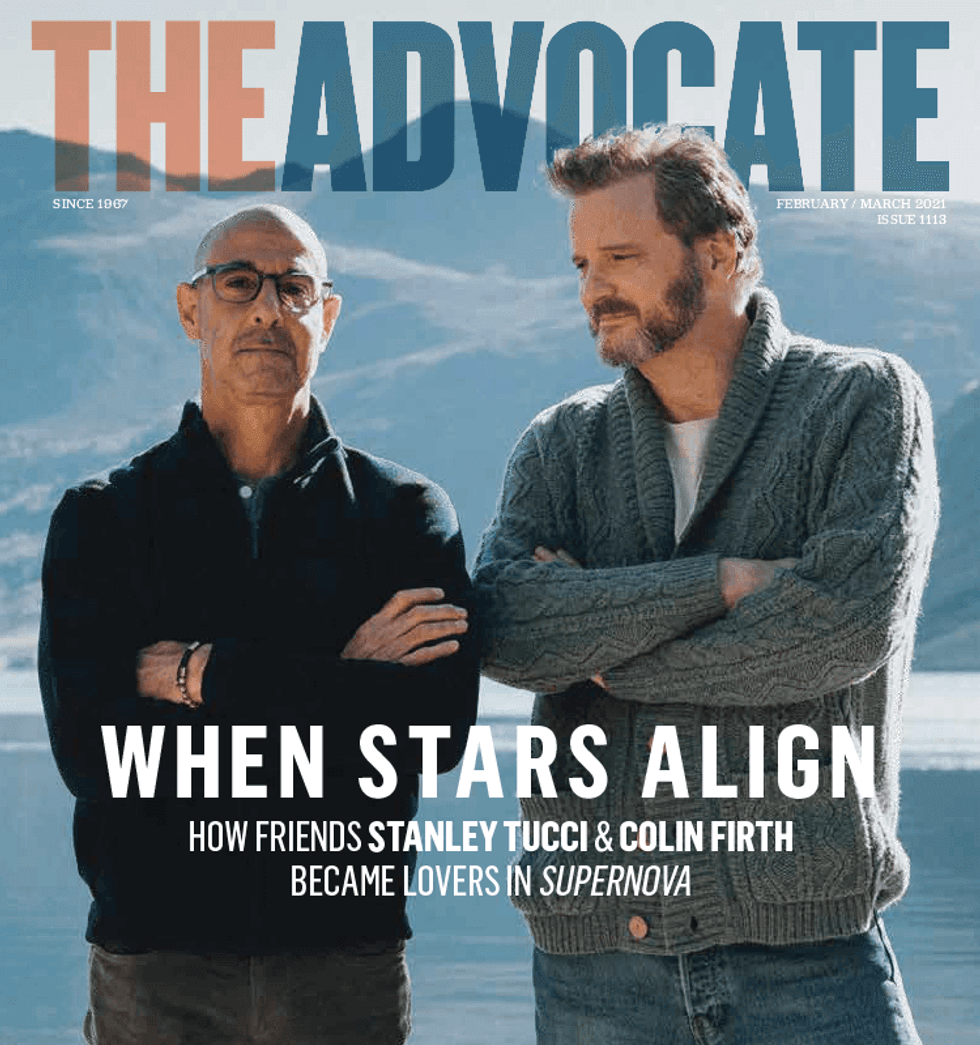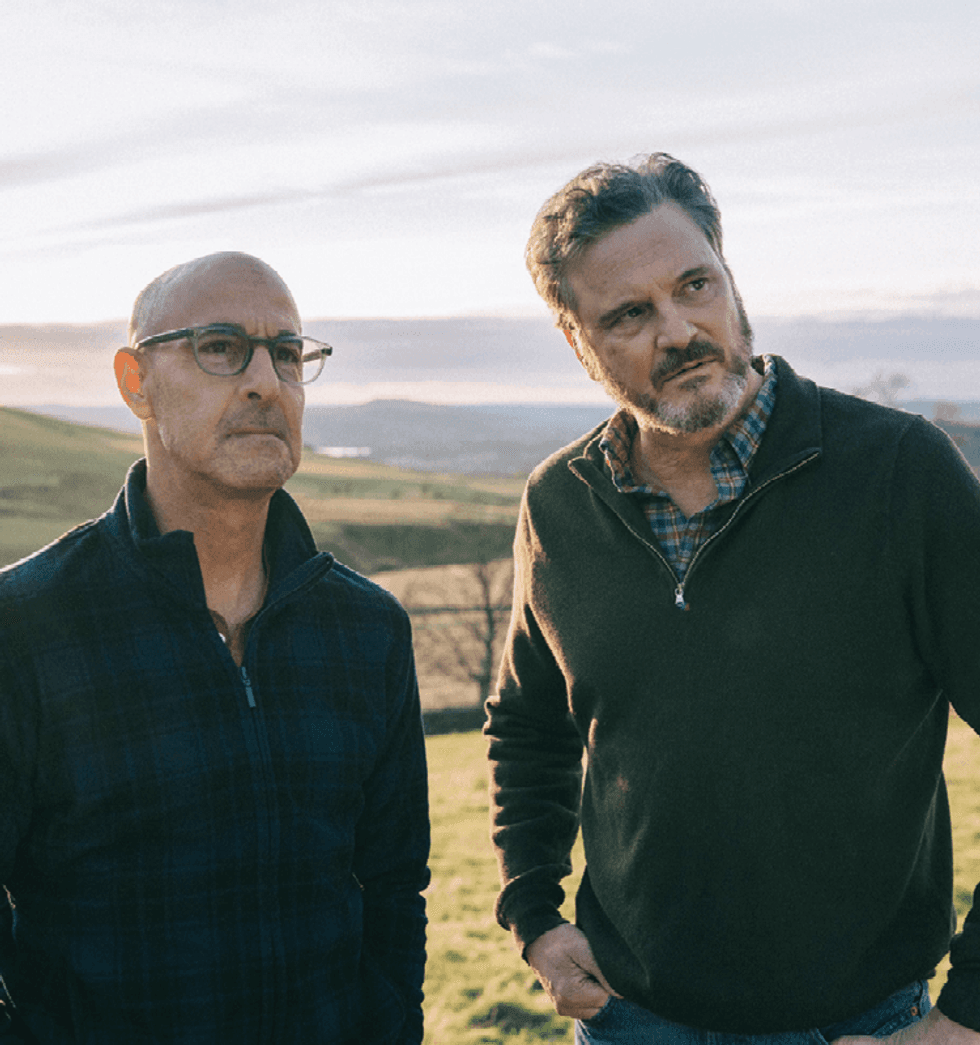Stanley Tucci and Colin Firth spent a lot of time together filming Supernova in England's Lake District, a mountainous region made famous by Romantic poets like William Wordsworth.
Even after a full day of filming the story of Tusker (Tucci) and Sam (Firth), a gay couple grappling with Tusker's dementia diagnosis while on a road trip through the countryside, the pair sought each other out. Each evening, Tucci invited Firth over to his riverside bungalow for cocktails and a dinner he prepared, as there were no major restaurants or pubs nearby.
"I never got tired of it for a second," Tucci says of conversing with his costar. Even taking the train back to London on weekends, where both reside, the two "had the best time" spending hours together, he says.
"We should have got much more sick of each other," Firth jokes. "I miss him terribly when we're not together. And I find that when we are together, I feel like I'm recharging or plugging into an oasis of sanity and decency."

The actors spoke to The Advocate together but, due to social distancing rules, in separate dwellings through Zoom. Tucci notes how he missed gathering with his friend for the holidays, and with good reason. The men have a professional and personal relationship that extends decades.
They acted alongside each other in Conspiracy (2001) and the Coen brothers' Gambit (2012). And it was Tucci who convinced Firth to be his romantic partner in Harry Macqueen's Supernova.
Tucci "snuck" the script to Firth, who was moved by the material; his family had been impacted by dementia. "It touched me on all sorts of levels," says Firth, who was also attracted to the love story between middle-aged men, an "unusual" angle for Hollywood. "This little ecosystem that it created gave it such warmth and intensity," he says.
From the outset, Tucci knew he wanted to do the project with Firth as his on-screen partner due to their close friendship. When acting alongside a friend, "you feel safe with that person," he says. "You don't suddenly have to meet somebody in the makeup trailer, then jump into bed with them."
The strength of their working relationship became evident early on, when during a script reading, Firth made an unusual suggestion: that he switch roles with Tucci. His friend agreed; he had been thinking the same thing.
"We've just been around each other for some of the intense stuff and the cheerful stuff as well," Firth says. "That can really deepen a relationship, and it's quite hard to think of many other people in my life I could say that about."
When asked what each actor admires most about the other, the men provided long lists of qualities. Tucci loves Firth for his humor, his spontaneity, his being a great friend and father. Firth loves Tucci's charm -- not the "smarmy" kind -- and his intelligence and thoughtfulness. Also, Tucci has "the most extraordinary appetite...whether it's with food, whether it's painting, whether it's with home furnishings, whether it's with our profession and the way he approaches our own craft," Firth attests.

This real-life chemistry shines on-screen. Be it through the delivery of an oft-told joke at a roadside restaurant or a bedroom confrontation, Tucci and Firth deliver the nuances of a long-term couple with ease. Tucci also credits Macqueen's script for creating this authentic rapport and recognizing the strength of silence in addition to words.
"What was left unsaid or what was clumsily said was as beautiful as what was eloquently said. That's really impossible to find in a script," he says. Tucci adds that Macqueen understands that even in stories of intense sadness -- Supernova deals with the pain Tusker's deteriorating mind inflicts on both characters -- humor is essential. To paraphrase Firth, it's the lighter moments that are the hardest things to get right.
Notwithstanding the power of the film's subject matter and performances, Supernova comes out in a time when some might protest the casting of two straight men as a gay couple. Historically, LGBTQ+ roles have disproportionately gone to straight actors, despite there being no shortage of queer talent in the entertainment industry. James Corden, in particular, was slammed for his portrayal of a gay character in The Prom, a flamboyant depiction that was lambasted as "gayface" by critics.
Firth and Tucci, both 60, have been in the entertainment industry for decades -- long enough to remember that it was once taboo for any actor to take an LGBTQ+ role. Both have also played gay roles before, to acclaim. Firth was Oscar-nominated for starring in Tom Ford's A Single Man, the 2009 adaptation of the Christopher Isherwood novel, while Tucci endeared himself to a generation of gay fans and fashion aficionados with his portrayal of art director Nigel in The Devil Wears Prada (2006).
Ultimately, the pair praised the direction the conversation on casting has taken. "I think it's a good thing. Because I think that awareness [of the hurdles faced by gay actors] is heightened," says Tucci, pointing to past societal stigma and legal repercussions that hindered their careers. "They couldn't be openly gay because then they wouldn't be cast. And they certainly wouldn't be cast as leading men. And the fact that people are now finally able to come out and be openly gay in Hollywood is absolutely crucial."
"I think we're starting to see a change where openly gay actors are also playing straight leads, and then playing gay roles. And that's where it should be. Because otherwise it's not a level playing field. And that's not fair," he says, adding, "You're an actor. Whether you're gay or you're straight...you should be able to play whatever role you're right for and good at."

A script can also bear guilt for offensiveness, says Tucci, and in 2021, "there's no room" for "mocking" treatment of LGBTQ+ characters. "I've been sent scripts [that] ask to play a gay character. And I read it and go, 'That's just bad. That's just insulting. ... Nobody's going to play that role -- gay, straight, whatever.'"
Additionally, acting is a "representative profession," says Firth, and that comes with its own moral dilemmas, LGBTQ+ or otherwise.
"We are interpretive artists. We are not our own source material. We are always having to take a step into someone else's lived experience," he says. "I have never embarked on a role where I haven't thought early on, How dare you. Who the hell are you to think you can know anything about this person's world or what this person lives through or how they experience the world? It always starts off as a terrible sort of presumption."
As they're avatars of others' experiences, "it's incumbent on us to take a journey of exploration and hope that somewhere in that process, that if you apply enough honesty and sensitivity and empathy and rigor that you will discover something that resonates with people," Firth says. And as an actor, he's found his own heart changed in portraying lives different from his own because he is tasked with discovering where the character's life "intersects with my life."
"It can be a very positive experience of commonality," he concludes, "which perhaps would have been undiscovered otherwise."
Supernova is now playing in select theaters and will be available to stream February 16.
All photos courtesy of Bleecker Street.







































































Charlie Kirk DID say stoning gay people was the 'perfect law' — and these other heinous quotes